初中英语人教版八年级下册jiaoan
初中英语人教版八年级下册教学设计
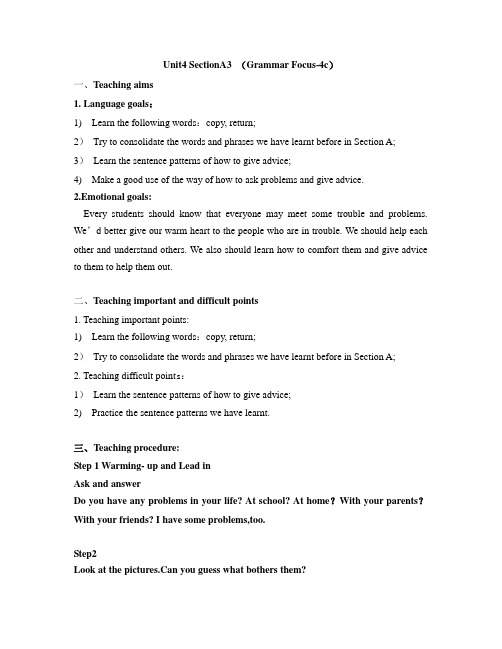
Unit4 SectionA3 (Grammar Focus-4c)一、Teaching aims1. Language goals:1) Learn the following words:copy, return;2)Try to consolidate the words and phrases we have learnt before in Section A;3)Learn the sentence patterns of how to give advice;4) Make a good use of the way of how to ask problems and give advice.2.Emotional goals:Every students should know that everyone may meet some trouble and problems. We’d better give our warm heart to the people who are in trouble. We should help each other and understand others. We also should learn how to comfort them and give advice to them to help them out.二、Teaching important and difficult points1. Teaching important points:1) Learn the following words:copy, return;2)Try to consolidate the words and phrases we have learnt before in Section A;2. Teaching difficult point s:1)Learn the sentence patterns of how to give advice;2) Practice the sentence patterns we have learnt.三、Teaching procedure:Step 1 Warming- up and Lead inAsk and answerDo you have any problems in your life? At school? At home?With your parents?With your friends? I have some problems,too.Step2Look at the pictures.Can you guess what bothers them?Step 3 Grammar Focus.1. Read the sentences in Grammar Focus, fill in the blanks.①你看上去很疲劳,怎么了?You ____ tired. What’s _____ _______?②昨晚,我一直学习到午夜,因此我没有睡足觉。
新版人教版新目标英语八年级下册全册教案
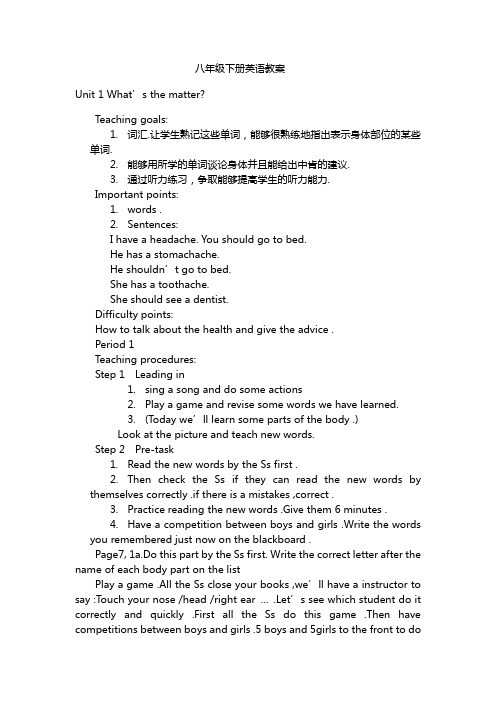
八年级下册英语教案Unit 1 What’s the matter?Teaching goals:1.词汇.让学生熟记这些单词,能够很熟练地指出表示身体部位的某些单词.2.能够用所学的单词谈论身体并且能给出中肯的建议.3.通过听力练习,争取能够提高学生的听力能力.Important points:1.words .2.Sentences:I have a headache. You should go to bed.He has a stomachache.He shouldn’t go to bed.She has a toothache.She should see a dentist.Difficulty points:How to talk about the health and give the advice .Period 1Teaching procedures:Step 1 Leading in1.sing a song and do some actions2.Play a game and revise some words we have learned.3.(Today we’ll learn some parts of the body .)Look at the picture and teach new words.Step 2 Pre-task1.Read the new words by the Ss first .2.Then check the Ss if they can read the new words by themselvescorrectly .if there is a mistakes ,correct .3.Practice reading the new words .Give them 6 minutes .4.Have a competition between boys and girls .Write the words youremembered just now on the blackboard .Page7, 1a.Do this part by the Ss first. Write the correct letter after the name of each body part on the listPlay a game .All the Ss close your books ,we’ll have a instructor to say :Touch your nose /head /right ear ….Let’s see which student do it correctly and quickly .First all the Ss do this game .Then have competitions between boys and girls .5 boys and 5girls to the front to do what the instructorsaid .if you are wrong ,please go back to your seats ,the last one who stands at the front is the winner .Step 3 While-task1.Look at the picture and learn the main sentences.A: What’s the matter with you ?B: I have a cold.2. SB Page 7,1c Look at the pictures , work in pairs and act out.3. SB Page 7, 1b .(1) Listen and check the answers .(2) Listen and fill in the blanks.Step 4 Post-task同桌之间设计一个医生与病人之间的对话.Step 5. Exercises in classPeriod 2Teaching procedures :Step 1 Leading in1.Revise : Ask several pairs of students to the front of the classroomto act out the dialogue:What’s the matter with you ?I have a sore throat.Then ask others : What’s the matter with him/her ?Help Ss answer : He has a sore throat. He should drink lots of water.2.look at pictures and practise the dialogue.Step 2 While-taskSB Page 8, 2a1.Point out the eight items in this activity .Read the item to theclass .Ss repeat .2.There are different conversations .Listen carefully . people aretalking about health problems they have and getting advice .3.Match the problems with the advice .4.Check the answers .SB Page 8, 2b .Pay attention to the four pictures .1.Each of these pictures illustrates one of the conversations .2.Play the tape ,write the missing words on the blank lines .3.Play the tape again and check the answers .4.Pairwork. Practice reading the dialogues in the pictures .Taketurns having the problem and giving the advice .5.Practice reading the dialogue in 2c ,and make their onw conversations .6.Act out the dialogue .SB Page 9, 3a .1.Point out the picture and ask Ss to describe it .(There is a boy sitting on a bench .He’s sick .A teacher is talking to him )2.Pay attention to the dialogue and the blanks in the dialogue .3.Fill in the blanks in the conversation .4.Go over the answers.5.Practice reading the dialogue with a student, then work in pairs . Step 3 Post-taskSB Page 9 , 3b .1.Look at the picture and make your own dialogues setting 3a as an example .2.Act out the dialogue .Ask some pairs to come to the front to act out their onw dialogues .SB Page 9, Part 4.1.Read the instructions and demonstrate what a “mime”is .2.Read the dialogue by the Ss .3.Ask a student to come to the front and mime an illness ,the other Ss guess what the illness is .4.Ask one student to give advice .5.Give several students an opportunity to come to the front and mime an illness .Step 4Exercises in classHomework1.When you had some problems. Please remember what the doctor said .Remember the new words .Period 3Teaching procedures :Step 1 Leading1.Play the game :One student mimes an illness , the other students guess the illness and give advice .What’s the matter? Do you have a sore throat ?2. Revise how to talk about health and give advice.Step 2 Pre-taskSB Page 10 ,1a .1.Look at the picture .Point out the four new words and expressions .Say each word and ask Ss to repeat .2.The first picture .Explain something about it using one of the four words and expressions .3.Match the words with the pictures by the Ss .4.Check the answers .5.Practice reading and make sure the Ss understand the meaning of the words .SB Page 10 ,1b1.Read the four sentences ,Ss practice reading .2.Look at the picture and match each picture with advice.3.Check the answerStep 3 While-taskSB Page 10 ,2a & 2b .1.First ,make sure the Ss understand what they will hear .2.Then read the four names3.Listen and write the problems on the bland lines .If possible ,write what each person “should”and “shouldn’t”do for their problem.4.Check the answers .Step 4 Post-taskSB Page 10,2c .1.Ask two students to read the conversation to the class .2.Pairwork .Make conversations with your partner .3.Act out the conversations for the class .4.Write two dialogues in the exercise book .5.Exercises in classPeriod 4Teaching procedures :Step 1 LeadingDiscussion: how to keep healthy.Step 2 While taskSB Page 11, 3a1.Read the article and fill in the form.2.Check the answers .3.Explanation4.ExercisesStep 3 Post taskSB Page 11, 3bLet the Ss read the paragraph and fill in the blanks .Check the answers .SB Page 11 ,Part 4.Play the gamePeriod 5 Self checkSB Page 12 , Part 1 .1.Fill in the blanks on their own .2.Make your own sentences with the words .SB Page 12, Part 2.Read the letter .Make sure Ss can understand it . Step 6 Homework1.Remember the words in this unit .2. Do the exercises on Pages 6-8of the workbook . 【课后反思】Unit 2 I’ll help clean up the city parksUnit 2 Section A 1a-Grammar Focus【学习目标】1.重点词汇用法及短语动词用法。
人教版八年级英语下册教学计划(10篇)

人教版八年级英语下册教学计划(10篇)八年级英语下册教学计划 1一、指导思想以“英语课程标准”为宗旨,适应新课程改革的需要,面向全体学生,提高学生的人文素养,增强实践能力和创新精神。
正确把握英语学科特点,积极倡导合作探究的学习方式。
培养学生积极地情感态度和正确的人生价值观,提高学生综合素质为学生全面发展和终身发展奠定基础。
二、全期教学总目标学生应有较明确的英语学习动机和积极主动的学习态度。
能听懂教师对有关熟悉话题的陈述并能参与讨论。
能读供七至八年级学生阅读的简单读物和报纸杂志,克服生词障碍,理解大意。
能根据阅读目的运用适当的阅读策略。
能与他人合作,解决问题并报告结果,共同完成学习任务。
能在学习中互相帮助,克服困难。
能合理计划和安排学习任务,积极探索适合自己的学习方法。
在学习和日常交际中能注意到中外文化的差异。
三、教材简要分析《新目标英语》八年级(下册),全书共有十个单元,另两个复习单元。
本教材各单元话题灵活,贴近生活实际。
本册书将学习的一些语法知识点有:一般将来时、过去进行时、现在完成时、间接引语、时间状语从句、条件状语从句、反意疑问句等。
同时每个单元后都提供了一篇阅读文章,用以训练学生的阅读能力,扩大学生的阅读量。
四、学情简要分析八年级共有四个教学班,通过初一年半的英语学习,大多数学生已能听懂有关熟悉话题的语段和简短的故事。
能与教师或同学就熟悉的话题交换信息。
能读懂短篇故事,能写便条和简单的书信。
但由于各种因素的.影响,学生发展参差不齐。
有少数学生因为基础不够好,学习很吃力。
五、提高教学质量的可行措施及教改措施1、面向全体学生,注重素质教育。
2、以学生为主体,尊重学生个体差异。
3、采用活动途径,倡导体验与参与。
4、开发课程资源,拓展学用渠道。
具体来说:1.认真专研教材和课标,精心备课,认真上好每一堂课。
确定每堂课的基础内容,预备内容和拓展内容,满足不同层次学生的不同需求。
2.充分利用现有的现代化教学设备,加强直观教学,提高课堂效率。
Unit10 Section B 2a-2e教案人教版初中英语八年级下册
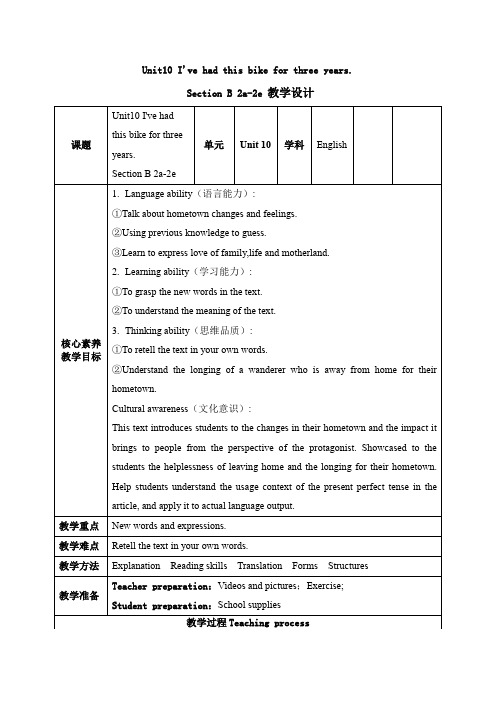
Unit10 I've had this bike for three years.Section B 2a-2e 教学设计and get students read it carefully and find the answers.9.Check the answers together and explain the part in detail.10.R ead the whole passage again.Post reading1.Get students to Find expressions in the passage that have the same meanings as these words and phrases in 2b.2.Check the answers together and explain these vocabulary.3.Lead students to read the short passage in 2c and fill in the missing words according to the reading part.4.Read and check the answers together.小结及情感教育(Summary and Emotion)1.Lead students to talk about hometown changes by using some pictures.2.To show a simply outline about the passage and lead students to retell the passage.Finish sometasks andlearn wordsand phrases.Free talk andretell.Practice andteach somelanguagepoints.Emotionaleducation andsummary.课堂小结本课通过主人公的经历,讲述了家乡的变化以及主人公对家乡的热爱之情,教育学生意识到事物处在不断变化当中,培养学生对家乡的归属感,并立志回报家乡的精神。
人教版八年级下册英语说课稿
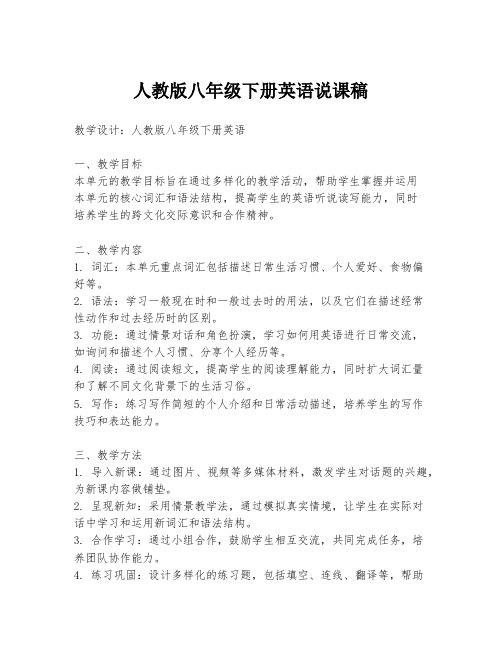
人教版八年级下册英语说课稿教学设计:人教版八年级下册英语一、教学目标本单元的教学目标旨在通过多样化的教学活动,帮助学生掌握并运用本单元的核心词汇和语法结构,提高学生的英语听说读写能力,同时培养学生的跨文化交际意识和合作精神。
二、教学内容1. 词汇:本单元重点词汇包括描述日常生活习惯、个人爱好、食物偏好等。
2. 语法:学习一般现在时和一般过去时的用法,以及它们在描述经常性动作和过去经历时的区别。
3. 功能:通过情景对话和角色扮演,学习如何用英语进行日常交流,如询问和描述个人习惯、分享个人经历等。
4. 阅读:通过阅读短文,提高学生的阅读理解能力,同时扩大词汇量和了解不同文化背景下的生活习俗。
5. 写作:练习写作简短的个人介绍和日常活动描述,培养学生的写作技巧和表达能力。
三、教学方法1. 导入新课:通过图片、视频等多媒体材料,激发学生对话题的兴趣,为新课内容做铺垫。
2. 呈现新知:采用情景教学法,通过模拟真实情境,让学生在实际对话中学习和运用新词汇和语法结构。
3. 合作学习:通过小组合作,鼓励学生相互交流,共同完成任务,培养团队协作能力。
4. 练习巩固:设计多样化的练习题,包括填空、连线、翻译等,帮助学生巩固所学知识。
5. 反馈评价:通过课堂小测验和作业检查,及时了解学生的学习情况,给予适当的反馈和指导。
四、教学过程1. 热身活动(5分钟)- 通过播放与日常生活相关的图片或视频,引导学生讨论自己的日常习惯和喜好。
2. 新课呈现(15分钟)- 教师介绍本单元的核心词汇和语法点,通过情景对话的方式,让学生在实际语境中学习和运用。
3. 合作探究(20分钟)- 分组活动,让学生通过角色扮演、信息差等方式,练习用英语交流和描述个人习惯和经历。
4. 练习巩固(15分钟)- 设计相关的练习题,让学生独立完成,然后小组内讨论答案,教师巡视指导。
5. 阅读拓展(10分钟)- 阅读一篇与单元主题相关的短文,让学生了解不同文化背景下的生活习俗,并回答相关问题。
新人教版初中英语八年级下册试讲教案

新人教版初中英语八年级下册试讲教案
教学目标
本次课程中,学生将能够研究家庭成员的称谓,并掌握如何询
问家庭成员的职业。
学生还将练听、说、读、写各方面的英语技能。
教学准备
- 教材:新人教版初中英语八年级下册
- 班级:八年级
- 时间:45分钟
- 工具:黑板、粉笔、投影仪、PPT
教学过程
步骤1:导入
1. 老师与学生打招呼并引入本节课的话题。
2. 通过PPT展示家庭成员的图片,并询问学生家中的人都有谁。
步骤2:听力
1. 放一段有关家庭的听力,并让学生根据听到的内容填空。
2. 放第二段听力,让学生判断正误。
步骤3:研究生词
1. 让学生根据PPT上的图片研究一些家庭成员的称呼。
2. 学生阅读课文中的重点句子并理解含义。
步骤4:对话练
学生分为小组,进行对话练,内容为询问家人的职业。
步骤5:总结
让学生分享本节课程的收获,并总结所有研究到的新知识。
课堂作业
1. 完成课本中有关职业的题。
2. 制作一个关于自己家庭成员的PPT。
教学反思
本节课程中,学生对家庭成员的称谓和职业有了更深入的认识。
同时,在听力和口语上也有了一定的提高。
改进方面,可以加强学
生单词记忆和口语表达能力的练习。
初中英语人教版八年级下册Unit5《Section A 1a—2d》省级名师优质课教案比赛获奖教案示范课教案公开课教案

初中英语人教版八年级下册Unit5《Section A 1a—2d》省级名师优质课教案比赛获奖教案示范课教案公开课教案【省级名师教案】1教学目标一、知识目标:本课时结束时,学生能够1)认读、拼写并能在听说活动中正确运用以下单词:rainstorm能在听说活动中正确运用以下句型:①—Where was he? He was on the street.—What was he doing? He was walking home from the supermarket.②—What were you doing?—I was reading books at the library.2) 能用所学目标语言询问和回答在过去某个时间点某人在某地正在做什么。
3)能理解和掌握过去进行时态的意义和构成,并能正确运用过去进行时描述在过去某个时间点正在发生的动作。
二、技能目标1.听:能听懂谈论过去正在发生的动作的对话;2.说:(1)能使用目标语言准确询问过去某个时间点某人在哪里正在做什么;(2)能正确使用过去进行时表达自己或他人在过去某个时间点正在做的事情;3.读:能正确朗读对话,并读懂对话,掌握主要信息。
4.写:能利用采访到的信息写一篇报道,在报道中正确使用过去进行时。
三. 情感态度价值观目标:通过课文内容学习引导学生学会统筹安排时间,明白自己在过去的某个时间点做了什么,爱惜时间,爱惜生命,了解暴风雨可能会给人类带来的危害,并热爱大自然,热爱生活。
2学情分析教学内容分析:Unit5 What were you doing when the rainstorm came ? SectionA 1a-1c 是人教版英语教材八年级下册第五单元的第一课时,也是本单元的重点内容之一,包含本单元重要的语言知识和重点语法,是一节以听说为主的课型。
本单元的话题是围绕“过去进行时”这一时态展开教学活动,在听说的过程中引入了本单元的主要语法--过去进行时态,并对这一时态进行了口语和听力的反复练习同时为本单元进一步学习打下基础。
人教版英语八年级下册大单元整体教学设计【新课标】Unit 3

Section B部分是对家务劳动这一主题的发展和延伸讨论,侧重表达孩子和家长在家庭事务方面的不同分工及关系。加强学生的家庭责任意识教育。老师在教学过程中要引导学生对不同观点的内容进行提取和理解,并让他们根据不同的观点进行辩论,锻炼学生的思维。
单元
学情
分析
已有
基础
八年级的学生更愿意在课堂学习过程中参与到活动中来,希望有更多的机会用英语来表达自己的观点。本单元的话题来自学生的生活经历,学生在人教版英语七年级下册Unit 4 Don' t eat in class Section B中己经学习了许多表示家务劳动的动词短语:do the dishes, help his mom make breakfast, clean his room等,为学生们的口语表达和书面表达提供了语言基础。关于could表达委婉请求和获得许可的肯定及否定回答可能会错用。因此在设计课堂教学活动时,通过设立学生的真实生活场景,将学生带入语言情境,激发学生兴趣,积极参与到课堂学习和创新之中,多次复现,击破重难点,从而达到运用掌握。
3.能够就青少年是否应当承担家务劳动发表自己的观点。运用英语熟练表达各种家务英文活,掌握陈述观点的英文词汇和列举,说明原因结果的各种连词。
4.初步了解议论文的最简单最常用的写作结构和写作的方法技巧,理清范文结构,能独立仿写范文。能与小组成员合作讨论,碰撞思维,发表观点并且给出理由,发现并改正语法及拼写错误。
人教版八年级下册英语教案道客巴巴
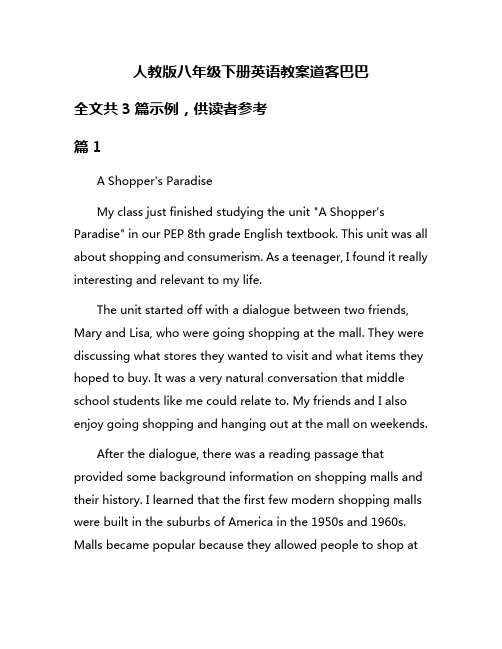
人教版八年级下册英语教案道客巴巴全文共3篇示例,供读者参考篇1A Shopper's ParadiseMy class just finished studying the unit "A Shopper's Paradise" in our PEP 8th grade English textbook. This unit was all about shopping and consumerism. As a teenager, I found it really interesting and relevant to my life.The unit started off with a dialogue between two friends, Mary and Lisa, who were going shopping at the mall. They were discussing what stores they wanted to visit and what items they hoped to buy. It was a very natural conversation that middle school students like me could relate to. My friends and I also enjoy going shopping and hanging out at the mall on weekends.After the dialogue, there was a reading passage that provided some background information on shopping malls and their history. I learned that the first few modern shopping malls were built in the suburbs of America in the 1950s and 1960s. Malls became popular because they allowed people to shop atmany different stores under one roof. They were protected from the weather and had amenities like food courts.As the reading passage described, malls offered a variety of shops selling clothes, shoes, accessories, electronics, sporting goods, books, toys, and more. Huge department stores often anchored the malls at either end. Walking through a big mall, you could find everything you needed all in one place. No wonder they were called "shoppers' paradises"!The passage also discussed some of the criticism around malls and excessive consumerism. It mentioned issues like traffic congestion, pollution from cars, destroying natural habitats to build malls, and encouraging people to spend beyond their means. However, it presented both sides in a balanced way.After reading and discussing the background information, we practiced various language skills related to shopping and spending money. This included lots of new vocabulary words like "bargain," "clearance," "splurge," "impulse buy," "window shopping," and more. We learned how to ask about prices, negotiating, and politely make requests at stores.There were also grammatical exercises on topics like forming plurals for different categories of merchandise. For example, we had to distinguish between singular and plural forms like "a pairof jeans" versus "two pairs of jeans." It was tricky but good practice.My favorite part was the role-play activities where we got to act out being shoppers and clerks at different types of stores. Getting into character and using the newly learnedwords/phrases made it much more engaging than just doing bookwork. I played the part of a sales associate at a clothing boutique trying to convince my friend to buy an overpriced handbag. It was fun!The unit culminated with a writing assignment where we had to describe our dream shopping mall and analyze the pros and cons of malls. I enjoyed flexing my creativity and argumentative skills for this essay. I designed my fantasy mall to have cool tech features like hologram assistants to help guide shoppers. But I also acknowledged some of the environmental downsides.Overall, I felt this was one of the most useful, practical units we've studied so far. As teenagers, my classmates and I are starting to shop independently and make decisions on how to spend our money. The skills we learned about budgeting, discounts, returns/exchanges, and responsible consumption will definitely come in handy. While it's fun to go on shoppingsplurges sometimes, this unit taught me the importance of being a smart, conscientious consumer.篇2The Guest is GodHave you ever heard the famous saying "The guest is God"? It's an Indian proverb that means you should treat your guests with the utmost respect and hospitality. This proverb is the central theme of the lesson "道客巴巴(The Guest is God)" in our 8th grade English textbook.The story is set in a small Indian village and follows a poor farmer named Sudama who used to be a childhood friend of Lord Krishna. Despite his humble circumstances, Sudama decides to visit the wealthy Lord Krishna who now lives in a grand palace. His wife is skeptical about the idea, questioning what kind of gift they could possibly bring that would be worthy of a king. But Sudama insists that the most valuable thing is the love and affection between old friends.With just a few handfuls of rice as a token gift, wrapped in an old cloth, Sudama sets off on the long journey to Krishna's palace. When he arrives, the guards initially turn him away, mocking his simple appearance. But Lord Krishna immediatelyrecognizes his childhood friend and rushes out to greet him with great joy and affection.Krishna embraces the poor Sudama warmly and ushers him inside with honor. Despite Sudama's embarrassment over his humble gift, Krishna accepts it as if it were the most precious offering. He treats his old friend as an honored guest, seating him comfortably and personally serving him delicious food and refreshments.As their reunion continues, Sudama starts to feelself-conscious about his poverty compared to Krishna's immense wealth and power as a king. But Krishna sees into his heart and reminds him that true friendship is beyond any materialistic concerns. Their bond is strong because it was formed in their innocent childhood days through sincere care and love for each other.In the end, when it is time for Sudama to depart, Krishna overwhelms him with abundant riches and treasures as a farewell gift. Sudama is reluctant to accept such valuable items, but Krishna insists, saying that he cherishes their friendship far more than any worldly riches. He asks only that Sudama returns home in peace and continues to regard him as a true friend for life.The story of the unshakable friendship between Lord Krishna and the humble Sudama drives home the moral of showing utmost respect, generosity and kindness to one's guests, no matter their social status. It teaches that the purest love stems from the depths of the human heart, not from materialistic considerations.From this lesson, I have learned the great significance of the Indian cultural value summed up in "The Guest is God." Even someone as powerful and wealthy as Lord Krishna honored his childhood friend Sudama and treated him as an esteemed guest deserving of the highest hospitality and warmth.The story has inspired me to be more welcoming, kind and generous towards any guests who may visit my home, regardless of their background or social standing. Like Krishna, I will aim to look beyond the surface and connect with the human essence of each guest through an open heart and sincere gestures of friendship.At the same time, I have also realized the reciprocal importance of being a gracious and humble guest myself when visiting others. Just as Sudama did not expect any grand reception despite Krishna's immense wealth, I too should not judge my hosts solely based on material factors. Instead, I shouldcherish the warmth of their hospitality and focus on upholding the human bonds of care and affection.The Indian ethos of "Atithi Devo Bhava" or "The Guest is God" is a profound philosophy that can help create a more compassionate and respectful world. By transcending superficial differences and nurturing the core human values of friendship, kindness and hospitality, we can strengthen the bonds that unite all people across all backgrounds and identities.In today's fast-paced world with its fair share of conflicts and divisions, this ancient wisdom of reverence for guests serves as a timeless reminder. It inspires us to slow down, disconnect from material pursuits, and reconnect with the inherent dignity and divinity within every human soul that arrives at our doorstep. I am grateful to have learned this lesson at a young age through our English textbook stories.篇3Dockaberra - An Imaginary World of WonderHey guys! Today I want to share my thoughts on the awesome lesson we just did in English class called "Dockaberra".I have to say, this was hands down one of the most fun andimaginative units we've covered so far this year. Let me tell you all about the wild and wacky world of Dockaberra!So Dockaberra is this make-believe place that our textbook describes. From what I understand, it's meant to be like a utopian society where everything is perfect and everyone is happy. The name "Dockaberra" itself is kind of a play on words combining "dock" (since it's an island) and "Canberra" which is the capital of Australia. Clever, right?The place is depicted as a remote island out in the middle of the ocean, untouched by the modern world. There are no factories or pollution, just pure natural beauty. The islanders live really simple lives as farmers and fishermen, growing their own crops and catching fish from the crystal blue waters. It's supposed to be like a paradise on Earth!One of the coolest things about Dockaberra is the way they make decisions. Instead of having one ruler or leader calling all the shots, they practice true democracy. Everyone has an equal say and they vote on every single decision that affects the community - how awesome is that? No parents, teachers or bosses telling you what to do, haha!From what the book describes, the islanders only work a few hours per day, with the rest of their time devoted to leisureactivities, sports, and cultural events. They have art festivals, music performances, athletic competitions - it sounds like an absolute blast. Sign me up to move there!Honestly though, my favorite part has to be their bizarre traditions and customs. For example, Dockaberra has this "Courtesy Custom" where you're supposed to mix up parts of common polite phrases. So instead of saying "Thank you very much" you'd say "Much thanks a lot". Or "Very nice to meet you" becomes "Meet you very nice". So weird but kind of hilarious!Then there's the whole concept of "Ramon Lists". Basically, the islanders make lists for every possible scenario or life event you can imagine. Need to pack for a trip? Consult the Ramon List on what to bring. Want to learn proper party etiquette? There's a Ramon List for that too. From the mundane to the extraordinary, they've got it all covered in list form!I could honestly go on and on about the quirky rituals and daily routines described in this lesson. The。
人教版八年级英语下册集体备课教案:Unit4 Why don’t you talk to your

课题课时Period 1教学目标语言技能听:能听懂他人他人陈述困难和麻烦的简单对话的内容,并获取主要信息。
说:1.能询问、陈述自己或他人的困难和麻烦,如What’s wrong?I’m really tired because I studied until midnight last night.2.能针对别人的困境提出解决的办法和建议,如What should Ido?Well,you should call him so that you can say you’re sorry.语言知识语音:熟练把握邀请句的升调语调,同时,在口语交流时能做到语音、语调准确、自然、流畅。
词汇:1.熟练运用:allow,wrong,midnight,guess,de al.2.掌握:What’s wrong, look through,work out.语法:1.能正确使用情态动词could,should表达或劝告,如:Youcould go to his house.2.能正确使用Why don’t you...?句型表达建议。
功能:学会询问、陈述自己或他人的困难和麻烦。
话题:了解人际交往的相关知识。
情感态度1.培养学生用英语交际能力,学会与人进行流畅的沟通和交流;2.使学生在活动中学会真诚、坦然地与人交谈。
学习策略认知策略:能在具体的情境中询问、陈述自己或他人的困难和麻烦,从而进一步主动练习和实践。
调控策略:.能针对别人的困境提出解决的办法和建议,并与人进行交流。
交际策略:培养学生合作能力,不断完善知识点,加强对话练习,学会与人闲聊,进行交流。
资源策略:通过多媒体、录音机等教学辅助工具。
文化意识了解中西方家长对待孩子参加课外活动和课外学习班的态度与做法。
教学重难点教学重点1.能正确使用情态动词could,should表达或劝告。
2.能正确使用Why don’t you...?句型表达建议。
教学难点1.Talk about problems.2.Give advice.教学方法听说法,交际法,教学辅助手段PPT, recorder.板书设计Unit4 Why don’t you talk to your parents?Sectio n A 1a-2dallow What’s wrong?wrong Why don’t you...?midnightguessdeal教后反思本节课学会了提建议的方式有:Why don’t you...? /Why not…?等Teaching ProcedureStages/TimingStep 1. warming-upStep 2 PresentationStep3 DiscussionStep 4Pre sentationStep 5 ListeningTeach ers’ a ctivitiesAfter greeting, ask students :What day is it today?What’s the date today?What’s the weather like today?1. Show the picture of a girl:T: Please look at this girl,what isshe doing?T: Look at her face,she isworried.because she has a lotof homework to do.Do yo uhave too much homework todo?Do you think it is serious?1a.Get them to read the followingsentences and discuss wheatherthey are serious or not. And thenwrite them in the approprite boxT:Do you have theseproblems?What kind of problemsdo you have?Students’ activitiesStudents answer the questions。
人教版初中英语八下教案范文全英文版
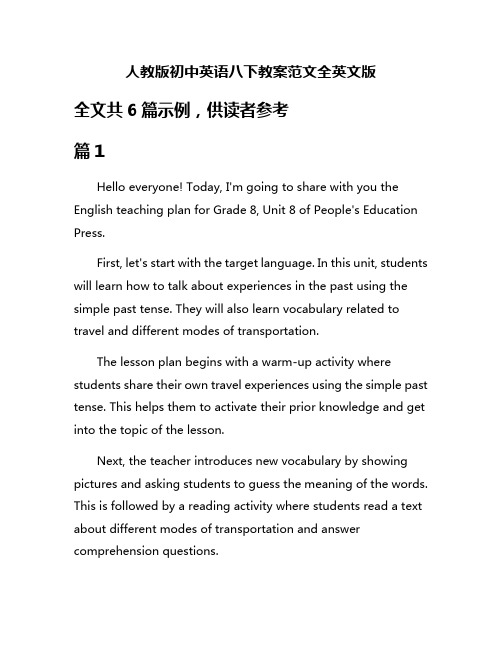
人教版初中英语八下教案范文全英文版全文共6篇示例,供读者参考篇1Hello everyone! Today, I'm going to share with you the English teaching plan for Grade 8, Unit 8 of People's Education Press.First, let's start with the target language. In this unit, students will learn how to talk about experiences in the past using the simple past tense. They will also learn vocabulary related to travel and different modes of transportation.The lesson plan begins with a warm-up activity where students share their own travel experiences using the simple past tense. This helps them to activate their prior knowledge and get into the topic of the lesson.Next, the teacher introduces new vocabulary by showing pictures and asking students to guess the meaning of the words. This is followed by a reading activity where students read a text about different modes of transportation and answer comprehension questions.After that, there is a grammar focus on the simple past tense. The teacher explains the rules and regular verbs and irregular verbs. Students then practice using the simple past tense in spoken and written activities.To reinforce their learning, students work in pairs or groups to create mini dialogues using the target language. This allows them to practice speaking and listening skills in a fun and interactive way.Finally, the lesson ends with a review activity where students summarize what they have learned and reflect on their progress.Overall, this teaching plan aims to help students improve their English proficiency through interactive and engaging activities. I hope you find this information helpful and wish you all the best in your English studies!篇2Hello everyone! Today, I'm going to tell you about the teaching plan for the 8th grade English textbook of the People's Education Press.In Unit 1, we will learn about the uses of plastic and how to reduce plastic pollution. We will also talk about the importance of recycling and how it can help protect the environment.In Unit 2, we will focus on sports and exercise. We will learn about different sports and their origins, as well as the benefits of staying active. We will also talk about the importance of teamwork and sportsmanship.In Unit 3, we will explore the world of technology and how it affects our daily lives. We will learn about the history of technology and how it has changed over time. We will also discuss the advantages and disadvantages of using technology.In Unit 4, we will dive into the world of literature and explore different types of stories and poems. We will learn how to analyze and interpret texts, as well as how to write our own stories and poems.In Unit 5, we will travel to different countries and learn about their cultures and traditions. We will explore the diversity of the world and learn to appreciate and respect different cultures.Overall, the 8th grade English textbook of the People's Education Press covers a wide range of topics and provides students with the opportunity to improve their language skillsand broaden their knowledge. I hope you all enjoy learning from this textbook and have fun exploring the world of English!篇3Hello everyone, today I'm going to introduce the teaching plan for the eighth grade English course from the People's Education Press. Are you ready? Let's dive in!In the beginning of the textbook, we will learn about different types of food and how to describe them. We will also practice ordering food in a restaurant and giving instructions in the kitchen. It's going to be delicious and fun!Next, we will move on to talking about vacations and travel. We will learn how to plan a trip, make reservations, and ask for directions. Imagine all the exciting places we can visit and explore!After that, we will study ways to communicate with others, including greetings, introductions, and expressing opinions. We will also learn how to talk about our daily routines and hobbies. It's a great way to make new friends and have interesting conversations.In the following units, we will cover topics like shopping, health, and the environment. We will practice using vocabulary related to these themes and learn how to express our thoughts and feelings effectively.Throughout the course, we will engage in various activities such as role-plays, group discussions, and games to enhance our language skills and build confidence in using English.By the end of the school year, we will have improved our English proficiency and be ready to tackle more challenging tasks. I can't wait to see all of us grow and succeed in our language learning journey!That's all for today's teaching plan. I hope you are as excited as I am to learn and have fun together. Let's work hard and make the most of this wonderful opportunity to improve our English skills. Thank you for listening, and let's have a fantastic year ahead!篇4Hey guys! Today I'm going to tell you about the teaching plan for the eighth grade English class according to the People's Education Press (PEP) version. So grab your pencils and notebooks, and let's get started!First of all, our English teacher will start the class with a warm-up activity to get our brains working. This could be a quick game or a short discussion in English to review what we learned in the previous lesson.Then, the teacher will introduce the new lesson or topic for the day. This could be a grammar point, vocabulary words, or a reading passage for us to practice. The teacher will explain the new material to us and give us some examples to help us understand.After that, we will do some exercises or activities to practice the new material. This could be fill-in-the-blank worksheets, group work, or even a game to make learning fun. The teacher will walk around the class to help us if we have any questions.Next, we will have some speaking practice. The teacher may divide us into pairs or small groups to have conversations in English. This will help us improve our speaking and listening skills.Finally, we will have a wrap-up activity to review what we learned in the lesson. This could be a quiz, a short writing assignment, or a fun review game. The teacher will make sure we understand the material before moving on to the next lesson.And that's a typical English class based on the People's Education Press (PEP) version for eighth graders. I hope you guys found this helpful and remember to study hard and have fun learning English!篇5Title: My Experience with the People's Education Edition Junior High School English TextbookHey guys! Today, I want to share with you my experience with the People's Education Edition Junior High School English textbook. This textbook is used in our school for the eighth grade English class, and I have had a lot of fun learning from it.One of the things I like about this textbook is that it has colorful pictures and interesting stories. The pictures make the text more engaging and easy to understand. For example, in the unit about famous landmarks around the world, there are beautiful pictures of the Eiffel Tower, the Statue of Liberty, and the Great Wall of China. These pictures make me excited to learn more about these places.Another thing I like about the textbook is that it has a lot of fun activities and exercises. There are crossword puzzles, word searches, and even role-playing activities that make learningEnglish more interactive and enjoyable. I especially like the group activities where we have to work together to complete a task. It's a great way to practice our speaking and listening skills.The textbook also has a lot of interesting reading passages that teach us about different cultures and traditions. For example, in one unit, we learned about the festival of Diwali in India. I had never heard of this festival before, and it was really cool to learn about how people celebrate it with lights and fireworks.Overall, I think the People's Education Edition Junior High School English textbook is a great resource for learning English. It's fun, engaging, and informative. I can't wait to see what other exciting things we will learn from this textbook in the future!篇6Title: My Eighth Grade English Lesson PlanHey guys! Today I'm gonna share with you my cool English lesson plan for eighth grade. This lesson plan is from the People's Education Press (PEP) version of the textbook. Are you ready? Let's go!First of all, in this lesson plan, we're gonna learn about different cultures around the world. We'll talk about festivals,traditions, and customs from countries like the UK, China, and the United States. It's gonna be so interesting to learn about how people celebrate and what they believe in!Next, we'll focus on grammar. We'll learn about verb tenses, sentence structures, and vocabulary. We'll even have some fun activities like games and quizzes to practice what we've learned. Don't worry, it's gonna be super fun and not boring at all!After that, we'll work on our listening and speaking skills. We'll watch videos, listen to dialogues, and practice speaking in pairs or groups. It's a great way to improve our pronunciation and fluency in English.And finally, we'll do some reading and writing exercises. We'll read short stories, articles, and poems in English, and then write our own stories or compositions. This is a great way to boost our creativity and language skills.So there you have it, my awesome eighth grade English lesson plan from the PEP textbook. I hope you guys enjoy learning English as much as I do. Let's have a blast in class and ace our exams! Good luck, everyone!。
新人教版八年级下册初中英语全册教案(教学设计)
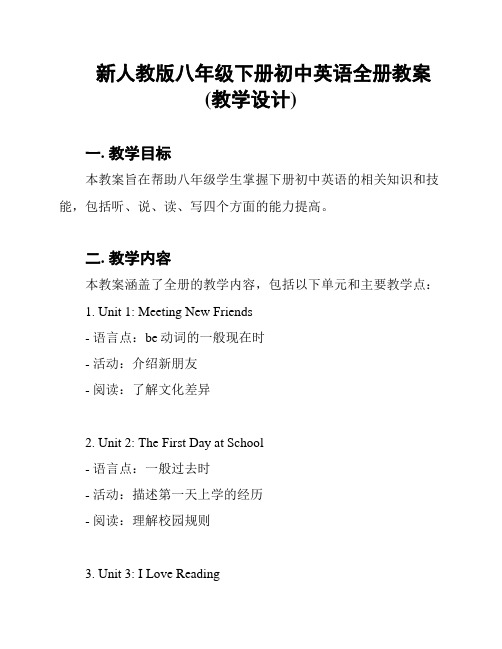
新人教版八年级下册初中英语全册教案(教学设计)一. 教学目标本教案旨在帮助八年级学生掌握下册初中英语的相关知识和技能,包括听、说、读、写四个方面的能力提高。
二. 教学内容本教案涵盖了全册的教学内容,包括以下单元和主要教学点:1. Unit 1: Meeting New Friends- 语言点:be动词的一般现在时- 活动:介绍新朋友- 阅读:了解文化差异2. Unit 2: The First Day at School- 语言点:一般过去时- 活动:描述第一天上学的经历- 阅读:理解校园规则3. Unit 3: I Love Reading- 语言点:情态动词can和must - 活动:介绍喜欢的书籍- 阅读:阅读理解4. Unit 4: My School Life- 语言点:形容词比较级和最高级- 活动:描述学校生活的不同方面- 阅读:了解不同的学校生活5. Unit 5: Our Future Jobs- 语言点:职业相关词汇- 活动:谈论未来的职业- 阅读:了解不同的职业6. Unit 6: Weather and Climate- 语言点:天气相关词汇和短语- 活动:讨论天气和气候- 阅读:了解不同地区的气候7. Unit 7: Enjoy Your Trip- 语言点:旅行相关词汇和短语- 活动:计划和描述旅行- 阅读:阅读旅行指南8. Unit 8: At the Farm- 语言点:动词的现在进行时- 活动:描述在农场的经历- 阅读:了解农场生活三. 教学方法本教案使用多种教学方法,包括但不限于:听力练、口语对话、阅读理解、小组讨论、写作练等。
教师将根据具体情况选择合适的教学方法进行教学。
四. 教学步骤1. 引入新课,激发学生兴趣。
2. 执行听力练以提高学生听力能力。
3. 进行口语对话练,帮助学生提高口语表达能力。
4. 进行阅读理解练,加深学生对课文的理解。
5. 进行小组讨论,让学生互相交流观点。
关于新人教版英语八年级下册英语教学计划(通用6篇)
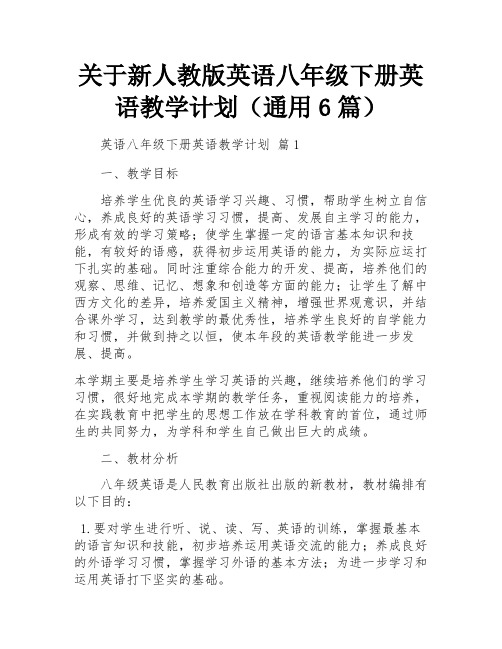
关于新人教版英语八年级下册英语教学计划(通用6篇)英语八年级下册英语教学计划篇1一、教学目标培养学生优良的英语学习兴趣、习惯,帮助学生树立自信心,养成良好的英语学习习惯,提高、发展自主学习的能力,形成有效的学习策略;使学生掌握一定的语言基本知识和技能,有较好的语感,获得初步运用英语的能力,为实际应运打下扎实的基础。
同时注重综合能力的开发、提高,培养他们的观察、思维、记忆、想象和创造等方面的能力;让学生了解中西方文化的差异,培养爱国主义精神,增强世界观意识,并结合课外学习,达到教学的最优秀性,培养学生良好的自学能力和习惯,并做到持之以恒,使本年段的英语教学能进一步发展、提高。
本学期主要是培养学生学习英语的兴趣,继续培养他们的学习习惯,很好地完成本学期的教学任务,重视阅读能力的培养,在实践教育中把学生的思想工作放在学科教育的首位,通过师生的共同努力,为学科和学生自己做出巨大的成绩。
二、教材分析八年级英语是人民教育出版社出版的新教材,教材编排有以下目的:1.要对学生进行听、说、读、写、英语的训练,掌握最基本的语言知识和技能,初步培养运用英语交流的能力;养成良好的外语学习习惯,掌握学习外语的基本方法;为进一步学习和运用英语打下坚实的基础。
2、使学生明确学习英语的目的性,3、培养初步运用英语交际的能力和自学能力。
三、教材重点、难点本册教材从语音、词汇、语法、阅读等方面着手1、语音教学:本册课本在上册的基础上进一步学习和运用音标和单词的发音规则,着重抓好学生的预习,自学能力。
2.词汇教学:这本教材需要学习和掌握的单词约有400个,有一定数量的固定搭配和成语,任务较重。
3、语法教学:本册课本的语法教学项目有:动词过去完成时、过去进行时、情态动词、五种简单句的结构等。
4、阅读教学是重中之重,本册课本中的阅读课文比上学期难了很多,仍以对话为主,还有一些简单的短文。
因此,提高学生的听说、表演对话的能力仍是本学期的一个教学重点,还应有一定的语法基础,具备相当的句子表达能力,能运用一定的词组和句型。
初中英语八年级下册Unit3第一课时说课稿

新课标人教版初中英语八年级下册Unit3第一课时说课稿今天我说课的内容是八年级下册第三单元第一课时SectionA的内容。
本单元谈论的主题是:“What were you doing when the UFO arrived?”通过本单元的学习,要让学生学会运用一般过去时和过去进行时来讲故事。
为此,我准备从以下几个方面来谈一谈我对这一课的教学设计。
一、教学目标①知识目标:1、词汇:bathroom bedroom kitchen while get out(of) take off 等。
2、目标语言:Where were you when the UFO arrived?I was in the kitchen/in the barber shop…What were you doing when the UFOarrived?I was cutting hair/cooking dinner…While the boy was walking down the street ,theUFO took off②能力目标:通过对话操练,听力练习,能熟练运用过去进行时谈论过去发生的故事。
③情感目标:培养同学们的合作意识,激发学生探索大自然的奥秘。
二、教学重难点:重点:词汇及目标语言的运用,过去进行时。
难点:when 和while 的用法。
三、教法“新课标”倡导让学生在老师的指导下,通过感知、体验,实践,参与和合作等形式,实现任务的目标,感受成功,有效地突破重、难点。
也为了更好地体现课改中以学生为主体,促进学生主动发展的要求,我确定采用以下的教法:1、脚手架的原则:在学习目标语言时,采用脚手架的原则,引导学生逐步感知、体验,然后去实践。
2、小组竞赛法:1b的听后巩固,我采用小组竞赛的形式,用记者采访的形式进行,评出最好的一组。
这样既激发了学生的兴趣,又培养了集体荣誉感。
3、任务型教学及合作探究法:学完1a、1b之后,学生已对过去进行时有了初步的感性认识,接下来我将呈现一组句子,让学生分组合作探究过去进行时这一语法的构成及用法。
初中英语四维目标的教案模板

课时:2课时年级:八年级教材:人教版《英语》八年级下册教学目标:一、语言能力目标1. 学生能够听懂并正确使用有关家庭、家具和房间布置的词汇和句型。
2. 学生能够运用所学词汇和句型进行简单的日常交流。
二、思维品质目标1. 培养学生观察、比较和归纳的能力。
2. 培养学生用英语表达自己观点的能力。
三、学习能力目标1. 学生能够通过合作学习,提高自主学习能力。
2. 学生能够运用多种方法进行词汇和句型的学习和记忆。
四、文化意识目标1. 培养学生对家庭、家具和房间布置等文化现象的了解。
2. 培养学生对中西方文化差异的认识。
教学重点与难点:一、教学重点1. 词汇:bedroom, kitchen, living room, bathroom, desk, chair, table, bookshelf, etc.2. 句型:What's in your bedroom? What do you usually do in your bedroom?二、教学难点1. 词汇的运用和拓展。
2. 学生用英语表达自己观点的能力。
教学过程:第一课时一、导入1. 教师用英语介绍自己的家庭情况,激发学生的学习兴趣。
2. 学生用英语简单介绍自己的家庭情况。
二、新课教学1. 词汇教学(1)教师展示图片,引导学生说出对应的英语单词。
(2)学生通过小组合作,完成单词卡片制作,并展示。
2. 句型教学(1)教师用图片或实物展示场景,引导学生用所学句型进行对话。
(2)学生分组进行角色扮演,练习句型。
三、巩固练习1. 学生完成课本上的练习题,巩固所学知识。
2. 教师针对练习题进行讲解,纠正学生错误。
四、小结1. 教师总结本节课所学内容,强调重点和难点。
2. 学生回顾所学知识,提出疑问。
第二课时一、复习1. 教师提问,检查学生对上节课所学内容的掌握情况。
2. 学生回答问题,巩固所学知识。
二、新课教学1. 词汇拓展(1)教师引导学生运用所学词汇,进行句子接龙游戏。
- 1、下载文档前请自行甄别文档内容的完整性,平台不提供额外的编辑、内容补充、找答案等附加服务。
- 2、"仅部分预览"的文档,不可在线预览部分如存在完整性等问题,可反馈申请退款(可完整预览的文档不适用该条件!)。
- 3、如文档侵犯您的权益,请联系客服反馈,我们会尽快为您处理(人工客服工作时间:9:00-18:30)。
Unit 5 What were you doing when the rainstorm came?
Section B 1a—1d 教学设计
【教学目标】
知识目标
1.学习并掌握下列单词:
realize理解;领会;认识到
2. 能正确使用以下常用表达:
make one’s way前往;费力地前进
3.能熟练掌握并使用下列重点句式:
When the basketball competition started, Kate was making her way to school.
While I was running back home, I saw a dog by the side the road and it was hurt.
4. 学会过去进行时态的构成和用法。
能力目标
1、通过听说训练,学会运用过去进行时态,谈论过去的事情或讲述过去的故事。
2、能在教学过程中流利地运用所学结构和句型,提高抓取和记录关键信息的听力技能。
情感目标
1、培养学生热爱动物的优良品质,学习Kate热心的优秀品质;
2、养成良好的守时习惯,做一个准时守约的人。
3、让学生积极参与英语课堂活动,从而培养学生的合作交流意识。
【教学重难点】正确使用过去进行时态,谈论过去的事情或讲述过去的故事。
【教学方法】情景教学法;任务型教学法;交际教学法。
【教学流程】
课前活动
Enjoy English music《What were you doing when I saw you last night?》.
教学过程
1、Warming up
Play guessing games.(The teacher have students ask and answer.) Please guess what the students were doing when I came in.
What was Betty doing when I arrived?
She was doing homework.
What was Sally doing when I arrived?
She was playing computer games.
What were the girls doing when I arrived?
They were cleaning the desks.
Ann wasn’t in the classroom.What was she doing when I arrived?
She was running to school.Why?
Maybe she woke up late ,so she missed the bus.
2. Leading-in
Like Ann,in our daily lives,we are often late for some events,like a ball game...(The students read the events together.Then match the events with the pictures.)
1a Think of a time when you were late for or couldn ’t go to an event and then tell your partner the story.
Including: What was the event?
What was the reason why you were late or couldn’t go?
Tell your partner the story.
Examples:
◆Last Wednesday, I was late for school. Because… When/While…
◆Last …, I couldn’t go to my friend’s birthday party. Because…When/While…
(Work in pairs.)
3、Listening
(1) What happened to the girl?(Students read the three questions and Predicate what
The event it is.)
1b Listen and write short answers to the questions.
1. What event happened at the school yesterday?
2. Who missed the event?
3. Which team won at the event?
(2)1c Listen again. Number the events [1-6] in the order they happened. Before listening,read the events and try numbering them.
____ Kate saw a dog by the side of the road.
____ Kate got to the bus stop.
____ Kate called the Animal Helpline.
____ Kate left the house.
____ Kate waited for someone to walk by.
____ Kate realized her bag was still at home.
(3)Listen again and fill in the blanks.
Kate: What a day I had! I ______ my house late and _______ the competition started, I was still making my way to school. _________I got to the bus stop,I _________ that my bag was still at home! But ________ I ______ __________back home, I _________ a dog by the side of the road and it was hurt. I _______ to call the Animal Helpline, but I didn’t have my phone so I had to _______ __________someone to ______ _____. Then I _______ his phone to call the helpline. So I didn't_______ ____ _____the competition.
4、Role play the conversation.
What do you think of Kate? Is she nice?
5、Survey
Besides Kate,two other students missed the school basketball competition yesterday.If you are a reporter,ask the three students why they were late
for the competition,then complete the mind maps.Practice in groups of four,using while or when.
Example:
Reporter: Hey, Kate, why did you miss the school basketball competition yesterday?
Kate: Well, I left my house late and when the competition started, I was still making my way to school.And when ...
...
Reporter:How about you,Tom,why were you late?
Tom:I had a toothache while...
(Work in groups of four.)
6、Report.
Make a report on the results of the survey. Each group chooses one to give the report.
The possible beginning:
Three students missed the school basketball competition yesterday.Kate left her house late . When...
7、The proverbs about time
Punctuality is the politeness of kings. 守时是最大的礼貌。
Homework.
1 Listen to the tape and role-play the conversation.
2 Write down the story your group made up and make it better.。
